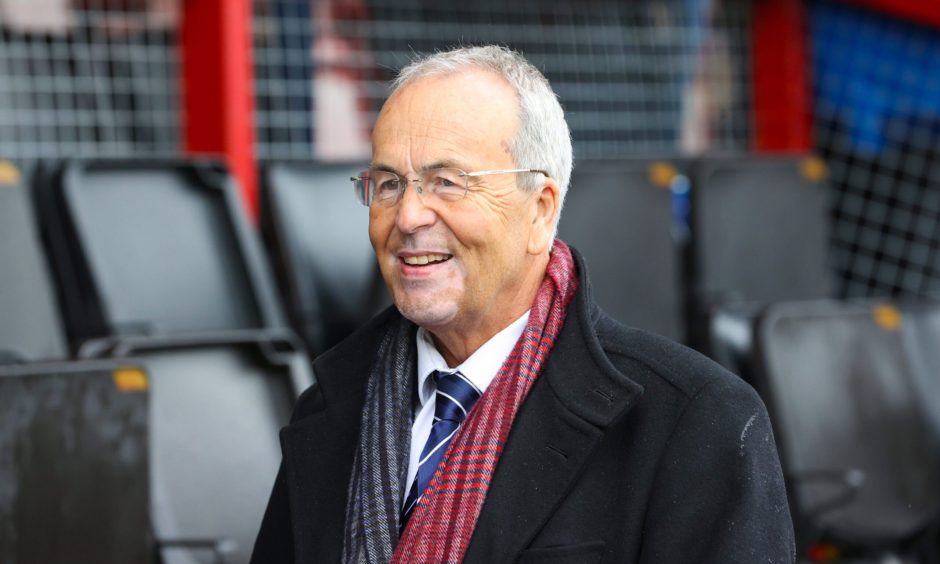Ross County will reflect on a season in which they often made life more difficult for themselves than it ought to have been.
But after being consigned to a second successive play-off, the Staggies found it within themselves to secure Premiership survival with impressive aplomb.
The 6-1 aggregate scoreline against Raith Rovers underlined County’s top-flight credentials in emphatic fashion.
We look back at five key moments in a long season – which brought three different managers and no shortage of drama.
End of Mackay reign prompts Adams return
After 12 games of the league season, County chairman Roy MacGregor decided it was time for change.
A 1-0 defeat at St Johnstone in November, which left the Staggies second bottom with 10 points, spelled the end for Malky Mackay following two-and-a-half years in charge.
At the time, MacGregor felt County had not done enough to kick on following their dramatic play-off escape the previous season, despite increasing the playing budget.
It took MacGregor little time to line up his replacement – and it was a familiar face to Staggies supporters.
Derek Adams’ third reign in charge at Victoria Park was intended as being a happy homecoming, having enjoyed much success in both of his previous stints.
At his unveiling, Adams spoke of his desire to help County push their boundaries by regularly finishing in the top-six, and even potentially aiming for European qualification.
Post-match interviews indicated no happy homecoming
County’s squad appeared to initially buy into the new era, as Adams claimed seven points from a possible nine, when claiming three successive clean sheets in his opening matches against Kilmarnock, St Mirren and Motherwell.
What was not apparent at the time was that Adams was forming a less than complimentary judgment of the standard of Scottish football he had returned to.
His now infamous comments, in the wake of a late home defeat to Dundee in his fifth match in charge, drew widespread attention.
Adams was highly critical of the lack of entertainment he had seen in the Scottish top flight, and indicated his previous club Morecambe had a team “100 times better” than the Staggies squad he inherited – a comment for which he later apologised.
Having sought to fire up his players, Adams would claim just two draws from the subsequent seven matches.
Following a 3-0 defeat to Championship side Partick Thistle in the Scottish Cup in January, Adams spoke of the job being a bigger one than he first envisaged, having not done enough homework prior to his return north.
Long-awaited opportunity for Cowie
A 5-0 defeat to Motherwell at Fir Park in early February prompted Adams’ resignation, with his third spell lasting just 79 days – in which he took charge of only 12 matches.
Morale was extremely low at the club, which found itself occupying the relegation play-off spot with a five-point gap behind St Johnstone.
Assistant boss Don Cowie was handed the interim reins – having wanted the opportunity following Mackay’s departure.
Cowie’s immediate message was to instill calmness and togetherness within a squad which had undergone big changes in January.
Adams brought in seven players, six of which on loan, while allowing the likes of Kyle Turner, Ben Purrington and Alex Samuel to move on.
Being tasked with bringing the best out of County’s long-serving players, along with those who had recently arrived, Cowie made it clear it would take a collective effort to steer the Staggies to safety following their turbulent spell.
Survival foundations laid in Dingwall
After starting his interim reign with back-to-back defeats on the road against Rangers and Dundee, Cowie was faced with a crucial first home fixture against bottom side Livingston.
It was an opportunity to pull clear of the Lions, however a victory for David Martindale’s men would have drawn them level with the Staggies.
The 3-2 victory, courtesy of Josh Sims’ late goal, proved to be the result which set the tone for a vastly improved stretch of home form.
In the eight Dingwall matches Cowie took charge of in the league, he would only lose once – in a surprise 5-1 defeat to Motherwell.
The haul of 15 points from that sequence went a long way to boosting County’s survival effort, and there were some memorable wins along the way.
The form of Simon Murray was particularly crucial, with the 23-goal striker netting eight goals across each of the Staggies’ final six home games of the campaign.
Triumphs over Hearts and Hibernian were notable, but the clear highlight came in the form of a stunning 3-2 win over Rangers.
The fully-merited triumph, which was County’s first against the Ibrox club, came in the final post-split fixture and provided Cowie and his players with the belief they needed to complete their survival job.
Convincing play-off success
The victory over the Gers provided the Staggies with huge confidence going into the split.
However a haul of five points – one more than St Johnstone – was not enough for them to avoid finishing in the relegation play-off spot on goal difference.
County got themselves into a strong position to secure automatic safety, but they were denied by a late equaliser away to St Johnstone which kept it alive going into the final day.
Saints picked up the win they needed against Motherwell, which meant County’s 2-2 draw with Aberdeen consigned them to the play-offs for a second successive campaign.
Given this psychological blow, there was the potential for a difficult tie against Raith Rovers. Especially considering how difficult the Staggies found it to progress past Partick Thistle 12 months previously.
Cowie led the Staggies by example, guiding them to a 2-1 victory in the first leg at Stark’s Park. That teed them up to finish the job off in style, with a comfortable 4-0 triumph at Dingwall on Sunday securing top-flight football for a sixth successive season.
MacGregor confirmed Cowie will be the man to lead the Staggies forward – admitting he made a mistake by not handing the 41-year-old his opportunity at an earlier stage in the season.
Cowie will now look to assemble a squad in time for the new campaign, but he can only benefit from the way he has risen to the challenge of steering the Staggies through difficult circumstances during his interim spell.












Conversation